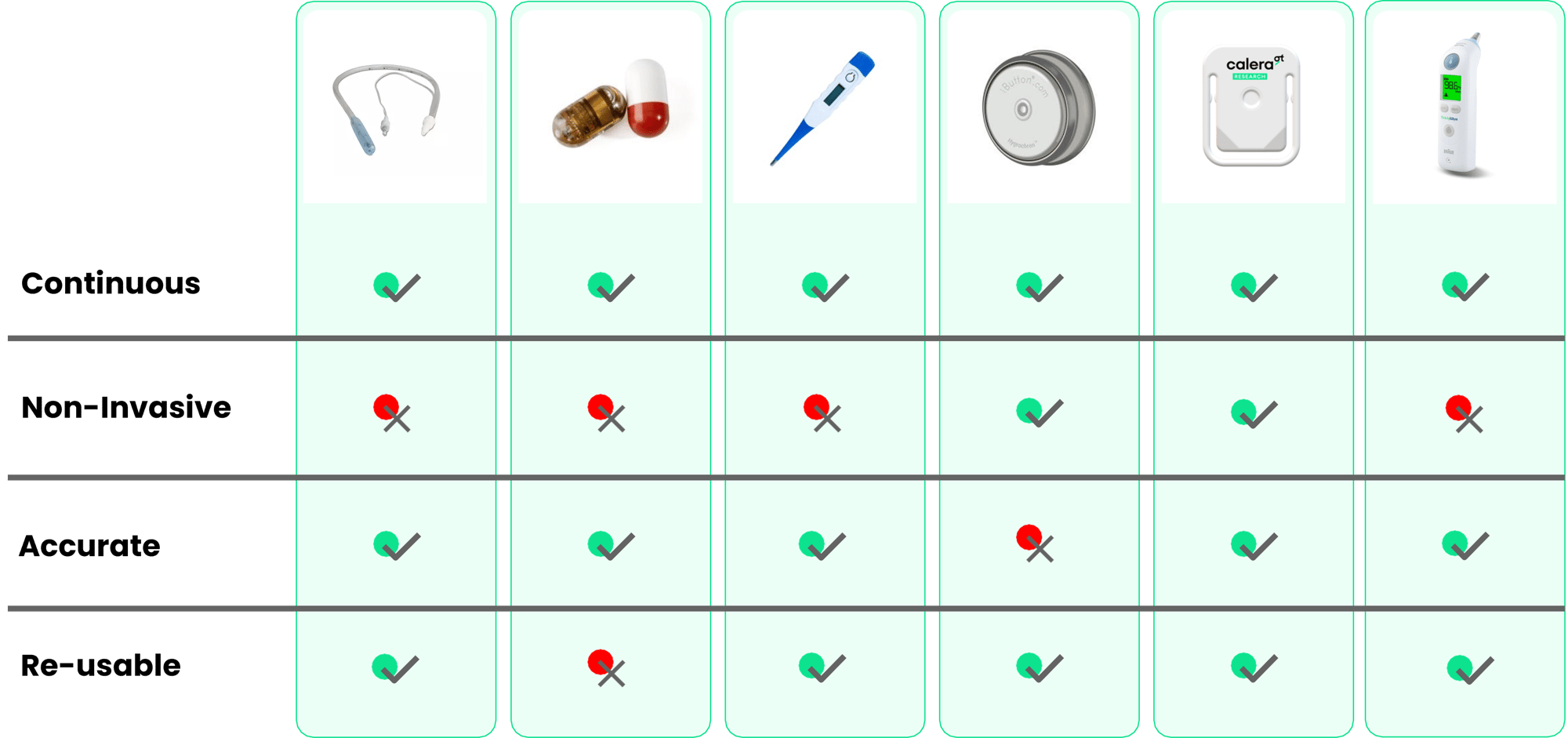Validation Study
Calera is a wearable device that allows researchers and clinicians to obtain continuous Core Body Temperature data in a non-invasive way, enabling research in a way that's easy for both them and the subjects involved. Our device has been validated in several independent papers, establishing its reliability and accuracy across different use cases.
Scientific Validation
Sports and Exercise Physiology Research
Researchers have validated the Calera sensor across multiple exercise modalities and environmental conditions. Januário et al. (2024) conducted validation during cycling exercise in heat, demonstrating accuracy with a mean bias of only -0.01°C and 95% confidence intervals of ±0.36°C when compared to gastrointestinal temperature pills. The study revealed reproducibility with intraclass correlation coefficients exceeding 0.98 for both male and female participants across varying exercise intensities.
Sleep and Circadian Rhythm Research
The Calera device has emerged as a convenient tool for sleep and chronobiology research, addressing a critical need for non-invasive circadian phase assessment. Kubota et al. (2025) conducted validation work comparing the sensor to rectal temperature measurements in real-world settings over 3-5 days of continuous monitoring.
The study demonstrated that the Calera sensor can effectively serve as an alternative method for assessing the circadian phase of core body temperature in healthy adults. The circadian temperature timing showed reliability (ICC = 0.96, 95%CI: 0.93 to 0.98) and substantial agreement (CCC = 0.96, 95%CI: 0.93 to 0.97) when compared to rectal probe measurements.
Wu et al. (2024) further validated the sensor's utility in circadian rhythm monitoring through a two-week longitudinal study involving 36 participants. The research demonstrated that circadian acrophases derived from Calera temperature data significantly correlated with reference measures from actigraphy (r = 0.79, p < 0.001).
Xu et al. (2024) conducted specialized sleep laboratory validation under controlled thermal environments, demonstrating the sensor's capability for continuous monitoring during sleep across different ambient temperatures. This research established the sensor's utility for investigating thermoregulatory responses during sleep and their relationship to sleep quality.
Clinical Applications and Medical Research
The sensor's versatility extends into clinical research environments. Ajčević et al. (2022) demonstrated its effectiveness in acute stroke patients, where continuous temperature monitoring is critical for patient management. The study encompassing 30 acute ischemic stroke patients showed strong correlation (r = 0.89, p < 0.001) with standard tympanic measurements and achieved 94.1% accuracy in detecting hyperthermia and 97.4% accuracy in fever detection. The Bland-Altman analysis revealed good agreement with a low mean difference of 0.11 ± 0.34°C and no proportional bias.
Individual Calibration and Precision
Each Calera Research unit undergoes individual calibration for heat flux and skin temperature measurements, ensuring optimal accuracy across devices.
Key Validation Studies:
- Priego-Quesada, J.I., et al. (2025) - Journal of Thermal Biology - Effect of Aerobic Fitness on Validity
- Kubota et al. (2025) - Sleep Science - Circadian Phase Assessment
- Januário, W.M., et al. (2024) - Journal of Thermal Biology - Validity and Reproducibility in Heat
- Wu, F., et al. (2024) - IEEE Journal of Biomedical and Health Informatics - Circadian Rhythm Monitoring
- Xu, X., et al. (2024) - Energy & Buildings - Sleep Research Applications
- Ajčević, M., et al. (2022) - Sensors - Clinical Applications in Stroke Patients
Feel free to contact us and discuss your study and the implications your use-case has on the accuracy.
Comparison vs Gold Standard
The validation research demonstrates the sensor's performance against established gold standards. Studies comparing Calera measurements to gastrointestinal pills consistently show bias values well within acceptable clinical and research thresholds. As your core temperature is not uniformly distributed in your body, various thermometer methods react differently to external and internal thermal influences. It is therefore important to always keep the thermometer method in mind when reading about study results. As CALERA Research’s algorithm is mainly based on ingestible pill data, it will also behave most similar to this method. Have a look in the papers below where the differences between these methods are discussed.
Esophageal vs. rectal probe vs. telemetric pill
Rectal probe vs. telemetric pill

Supporting Research Excellence
The Calera device empowers investigators to conduct high-quality thermal physiology research with convenience and accuracy. By eliminating the barriers associated with invasive measurement techniques, researchers can focus on answering fundamental scientific questions while maintaining the highest standards of measurement precision.
The growing body of peer-reviewed validation research establishes the Calera sensor as an essential tool for advancing our understanding of human thermal physiology across clinical, sports, and environmental research domains.
